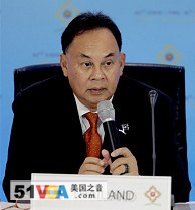Phuket, Thailand
23 July 2009
The annual gathering of the Association of Southeast Asian Nations and its dialogue partners has ended with host Thailand saying it will lead to greater regional integration. But on two regional issues - Burma and North Korea - very little was accomplished.
At the end of four days of meetings between ASEAN and its key partners, Thailand's Foreign Minister Kasit Piromya said the delegates agreed on key issues.
 |
| Thailand's FM Kasit Piromya delivers the speech during the closing ceremony in Phuket, southern Thailand, 23 Jul 2009 |
"Cooperation will continue to be enhanced so that ASEAN can respond more effectively to all pressing challenges, be it in financial and economic crisis, food and energy security and pandemic diseases," said Kasit.
He said ASEAN welcomed the renewed American commitment to the region after U.S. Secretary of State Hillary Clinton signed a treaty of friendship and cooperation.
Kasit also said the ASEAN's agreement to form the group's first human rights body would serve as a platform to promote and protect rights.
The rights body will have no power to punish violators, but is expected to develop more authority in the future.
Australian Foreign Minister Stephen Smith said many of the 27 governments represented at the meetings brought up concerns about North Korea and Burma, also known as Myanmar.
Burma has put democracy leader Aung San Suu Kyi on trial for breaking the terms of her house arrest and may jail her for up to five years. The military government has more than 2,000 political prisoners.
North Korea is refusing to negotiate an end to its nuclear programs.
Smith said although both countries stubbornly ignore the international community's wishes, the foreign ministers made their message clear.
"This international community pressure adds weight and does put pressure on both those countries," said Smith. "And, what we now want to see on both fronts is a response to that, both in terms of North Korea engaging in the six-party talks and the Myanmar authorities allowing Aung San Suu Kyi to take part fully in an election process."
China's Foreign Minister, Yang Jiechi said the six-party talks, which involve China, Japan, Russia, South Korea, and the U.S., should not be ruled out entirely.
"Although the talks have come across some difficulties, one must not ignore the fact that major progress was achieved some time ago so one should take a long-term and strategic point of view and work for the early resumption of the Six Party Talks," said China stays in close touch with all the parties concerned because this is a good cause, this is a very important cause," said Yang.
North Korea's spokesman at the meetings declared the talks to end its nuclear programs "dead" and blamed Washington for what it called a "hostile" policy.